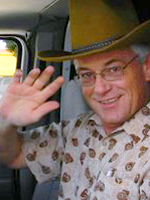Car tax repeal: A question of semantics
By Leon WordenWednesday, June 3, 1998
| Y |
Assemblyman George Runner, R-Lancaster, sent an emissary to City Hall last week, asking the Council to support the GOP effort to repeal the car tax. Almost everything we pay to the DMV when we register our car each year is tax -- an average of $185 per vehicle. (To find out exactly how much you would save if the car tax is repealed, visit www.calgop.org and use the special calculator you'll find there.)
If the car tax repeal were the whole proposal, the City Council would be right to fear the loss of revenue. Ninety-three percent of state car tax revenue goes directly to cities and counties. For Santa Clarita, that's about $5.5 million a year.
But that isn't the whole proposal. Assembly Republicans are proposing not only to repeal the car tax, but to couple it with a constitutional guarantee that cities and counties would get the money back through sales taxes. (No, sales taxes wouldn't go up. The state would get less.)
One wouldn't happen without the other. No constitutional amendment to make up the difference, no car tax repeal. No money could be diverted from schools, either.
Runner asked the Council for a position of "support if" -- support the proposal if city revenues are protected. Instead, the Council gave him a position of "oppose unless" -- oppose the proposal unless city revenues are protected.
It's a question of semantics. "We support it if" means almost the same as "we oppose it unless." But not quite.
With a position of "support if," Runner can go back to Sacramento and start fighting for a tax cut, something most California voters say they want. An angle of "support" from his constituent cities would be good ammunition.
But Runner and other Republicans won't get very far if their cities are "opposed," even if that opposition is tempered with the same caveat that the "support" position would carry.
"My cities support this fight, if we can also guarantee their funding" goes a lot farther than "My cities oppose this fight, unless we can guarantee their funding."
City council members in Lancaster recognized the difference and gave Runner a unanimous position of "support if" last week. Here's what they said:
"We are pleased to offer our support for tax relief for our citizens in the form of a reduction or elimination of the Vehicle License Fees (VLF). However, our support is contingent on a constitutional guarantee that local VLF funds be replaced on a dollar-for-dollar basis with state funds from the (non-schools) portion of the state budget ... We believe that California's hard working taxpayers should be granted significant tax relief. (The car tax repeal) is the most tangible way that the state can return the amount California's citizens were overtaxed."
The 1990 tax hike, the biggest in state history, overtaxed Californians to the point where this year the state has a surplus of over $4 billion -- roughly equal to the total car tax. Even in future lean years there would be no shortfall because of the constitutional protection. The state would have to trim fat from places other than schools.
You have to wonder what our City Council members were thinking last week when they adopted the staff recommendation of "oppose unless." Let's hope that none aspires for higher office anytime soon. Can't you just see the hit mail? A third grader could write it. "So-and-so voted against tax cut."
You also have to wonder why city staffers would put their bosses in such a politically senseless and sticky position, regardless of what the League of California Cities might think.
The League, generally opposed to any taxpayer-friendly tax-cutting initiative, opposes the car tax cut unless ALL local government revenue sources are constitutionally protected!
Some Council members have said privately that they didn't know how important the issue was to our local legislators when they voted last week. That's unfortunate. Absolution will come when they act on the letter Runner sent them Monday, and reconsider a position of "support if."
©1998 LEON WORDEN — ALL RIGHTS RESERVED

